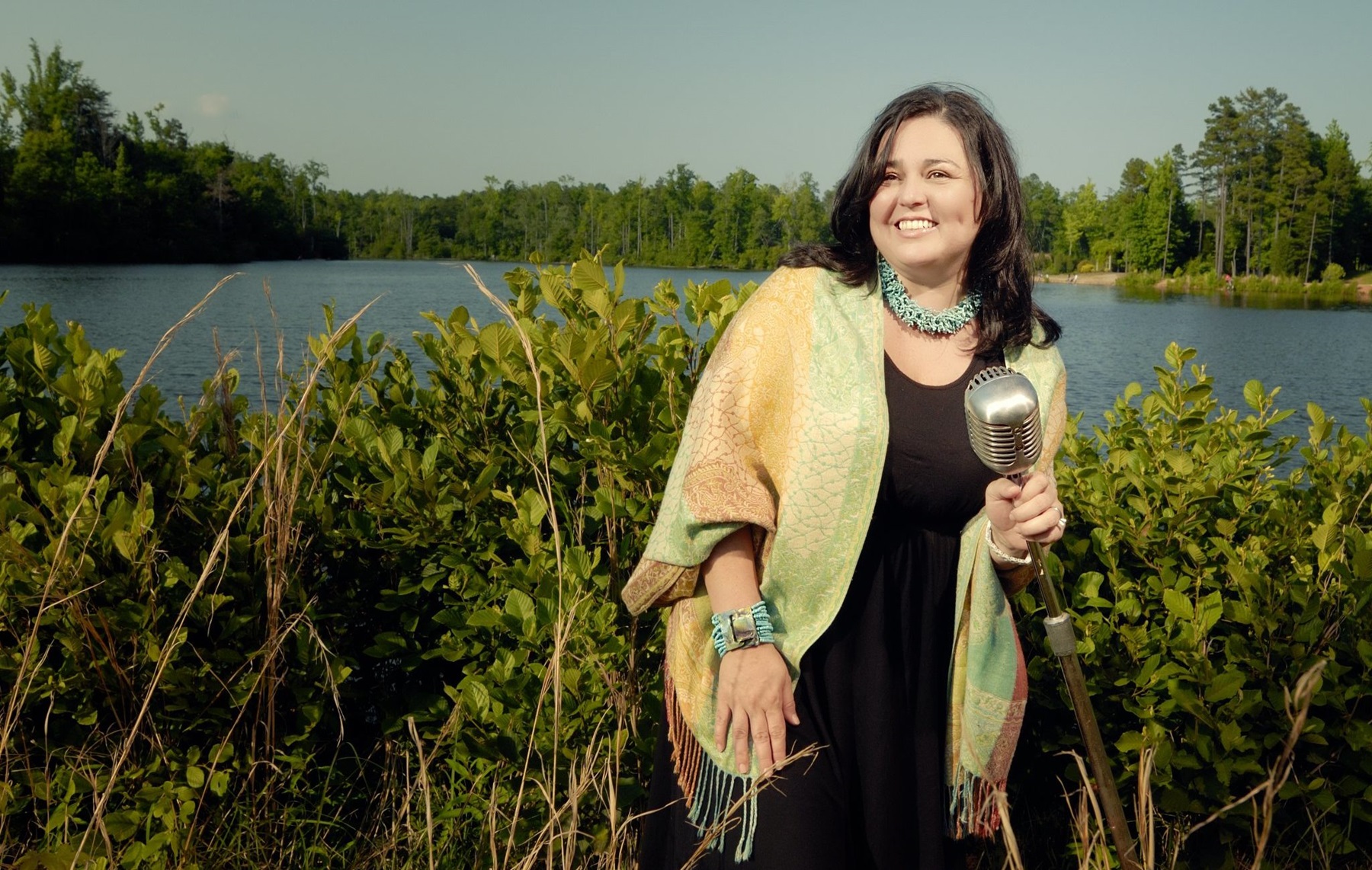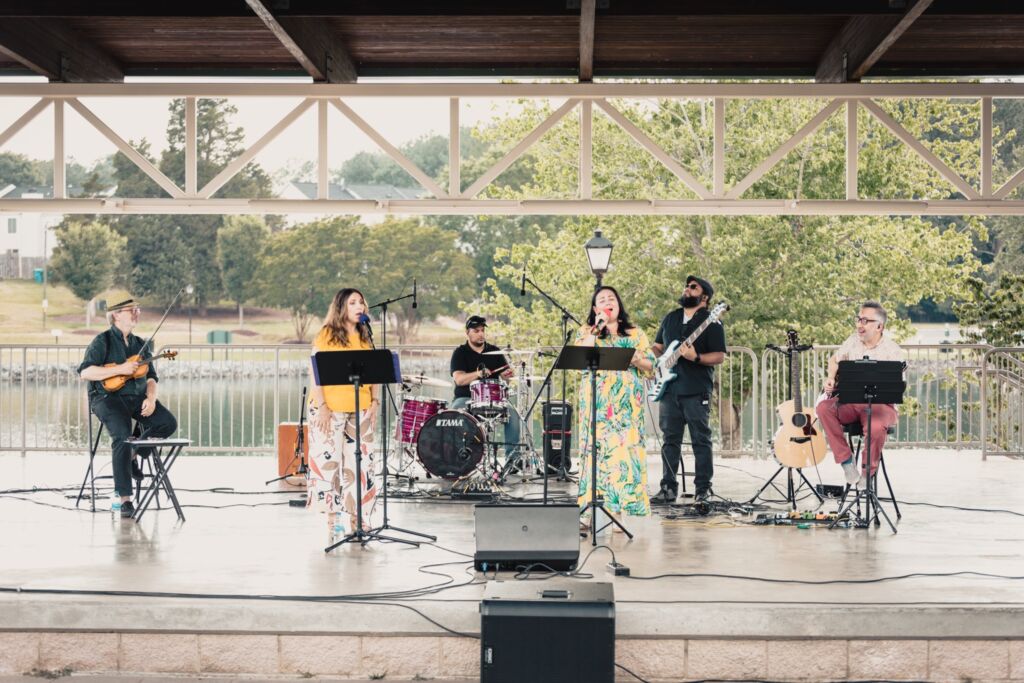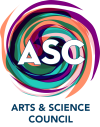ASC Fellowship Helps Ana Lucia Divins Delve Deeply into Therapeutic Music - and Expand Her Audience

By Page Leggett
Growing up in Colombia, Ana Lucia Divins sang in the choir, competed in singing contests and loved singing with her family. When she moved to Charlotte in 2001, she felt disconnected, and music became her way of finding community.
“When I first came, this was not the Charlotte we know today,” she said. “It wasn’t as diverse. So, finding those connections and making music in Spanish was exactly what I needed.”
And in recent years, she’s come to realize that music has the power to heal.
To further study the therapeutic properties of music – and share that with others – she applied for and received a $15,000 ASC Creative Renewal Fellowship.
Merely applying for the grant was beneficial. Completing the application was “a good catalyst to reflect” on her long, multifaceted musical journey. Divins used the grant to explore, create and record therapeutic music. She had two primary objectives for her fellowship:
- Attend a 10-day workshop/retreat called “Vocal Odyssey” led by musician and certified holistic voice therapist Nessi Gomes. The immersive experience, which Divins called “life-changing,” happened last October on the Greek island of Amorgos.
- Engage a sound engineer and videographer to record six original therapeutic songs.
Music transcends language and that’s important for a singer who straddles two cultures.
Mothering with music
“When I became a mother, I wondered if I should speak to my kids in English or Spanish,” she said. “My husband is American and speaks some Spanish. I wanted to preserve my culture and heritage – and pass it down to my kids – while honoring my husband’s heritage, too. The answer came to me, and once again, it was music. I would sing my kids the same lullabies I heard growing up.”
Those children are now 22 and 21, in college and currently studying abroad. And fully bilingual.
Divins did more than expose her own children to Latino culture. Since 2007 – when she and Irania Patterson launched Criss Cross Mangosauce – she’s worked to bridge cultural differences through music and offer bi-cultural learning opportunities in her community and beyond.
So, when she says, “music has a power that goes beyond entertainment,” she knows what she’s talking – or singing – about.
It’s not that she doesn’t appreciate music for music’s sake. “I love to be on a big, beautiful stage with all the lights pointing at me,” she said. “But where I really thrive is in interacting with people.”
She’s part of Café Amaretto, a music performing group that plays soulful Latin-American tunes alongside American classics. (Inclusivity is important to Divins; she always wants her audience – whether a room full of people or a single patient in a hospital room – to relate to her music.)

‘A way to serve’
When she started taking music to senior communities, she began to see the healing power it could have.
And she knows about the importance of healing. She had to leave her homeland for her own safety and needed to begin healing once she arrived in America. She felt it was important to assimilate, so learning English quickly was a priority.
But our personal histories have a hold on us; the past isn’t easy to escape. She eventually realized something was missing.
“I came to understand that one cannot be separated from something as significant as one’s roots,” she said. “I felt a strong need to go back. And a very natural way for me to return to those roots was music. Without my heritage and culture, I’m not fully myself.”
Libraries, museums, schools, community centers, festivals – Divins shared her music everywhere she could. It’s a ministry of sorts. She called it “a way to serve” and said that “sharing music is what keeps [her] going.”
She sings in both Spanish and English to ensure her music is accessible to anyone listening. Some of her songs don’t have lyrics, making them truly universal.
Responses to her music-as-a-tool-for-healing work have been enthusiastic. People aren’t dismissing it as “woo-woo.” They’re embracing it.
“Especially after the pandemic … more people are looking for natural and healthy ways to reduce stress and find peace,” she wrote in her grant application. “Live music shared in a therapeutic way offers … benefits for mind, body and soul. Also … mainstream healthcare organizations are now open to offering alternative ways of healing.”
A voice that heals
Music has always been central to Divins’ life. (“Throughout the years,” she said, “even at times when I stopped singing, music always finds its way back to me.”)
But seeing how patients responded to her therapeutic singing made her curious almost to the point of obsession, she said, about how music soothes our souls. She wanted music to be more than a hobby. In April 2022, she left her long-time corporate job to focus on bringing therapeutic music to people in need of healing. (And doesn’t that apply to all of us?)
Through the Music for Healing and Transition Program, she became certified to use her voice as a healing tool. “Sometimes, when I walk in a patient’s room, they’re anxious,” she said. “And the sounds, melodies and songs I share relax them. But music can also help with pain relief.”
The patients she sings to may be in assisted living, Hospice care or being treated for cancer. They’re dealing with serious, sometimes terminal, illnesses – and pain management is imperative. Being able to use her voice to lessen their pain is a privilege, Divins said.
She’s now studying for a second certification with the British Academy of Sound Therapy to become a holistic voice therapist. That program will teach her to “work in a deeper way, helping someone use their own voice, sound, breathing and visualization to process certain situations.”
She wants to give people the tools they need to soothe themselves. “You can make yourself feel more relaxed just by humming,” she explained.
By popular demand
When she’s sharing music by patients’ bedside, many of the melodies she sings come to her in the moment; they’re entirely improvised. When patients started asking for recordings of her music – so they could try to achieve the same level of peace and relaxation themselves – she wanted to oblige.
So, she collaborated with sound engineer Jorge Espinoza to record a six-song EP that takes listeners on a “sound journey.” She’s creating and developing the music concepts and songs with musician Carlos Crespo.
The songs are meant to take listeners from breakfast to bedtime. A calming, grounding tune starts the EP – and, presumably, a listener’s day. The song for noontime has a faster tempo to help listeners get and stay energized for the afternoon. The last song is a lullaby (with English lyrics) to end the day.
Her EP is in the final stages of production. She plans to upload it to digital platforms – Spotify, iTunes, YouTube – and ultimately share insights from her experience at a free and open-to-the community event.
Music means many things to Divins, as she shared in her grant application: “I see music as a connector, a deep source of joy, a way to express emotions and celebrate heritage and most importantly … bring an immense sense of peace, relaxation and deep healing.”
Follow the music.
Learn more about Ana Lucia Divins’ music at Charlotte Culture Guide, on her Facebook page at Divins Music and at her website Azul Healing.
Invest in ASC
ASC is committed to equity and believes cultural programs should be accessible to all, build bridges across difference, and reflect our changing community. To achieve this, we invest your dollars in the people, organizations, programs, and ideas that move us toward a more equitable, sustainable, and innovative creative ecosystem. Please complete the giving form below to help us achieve our mission.

